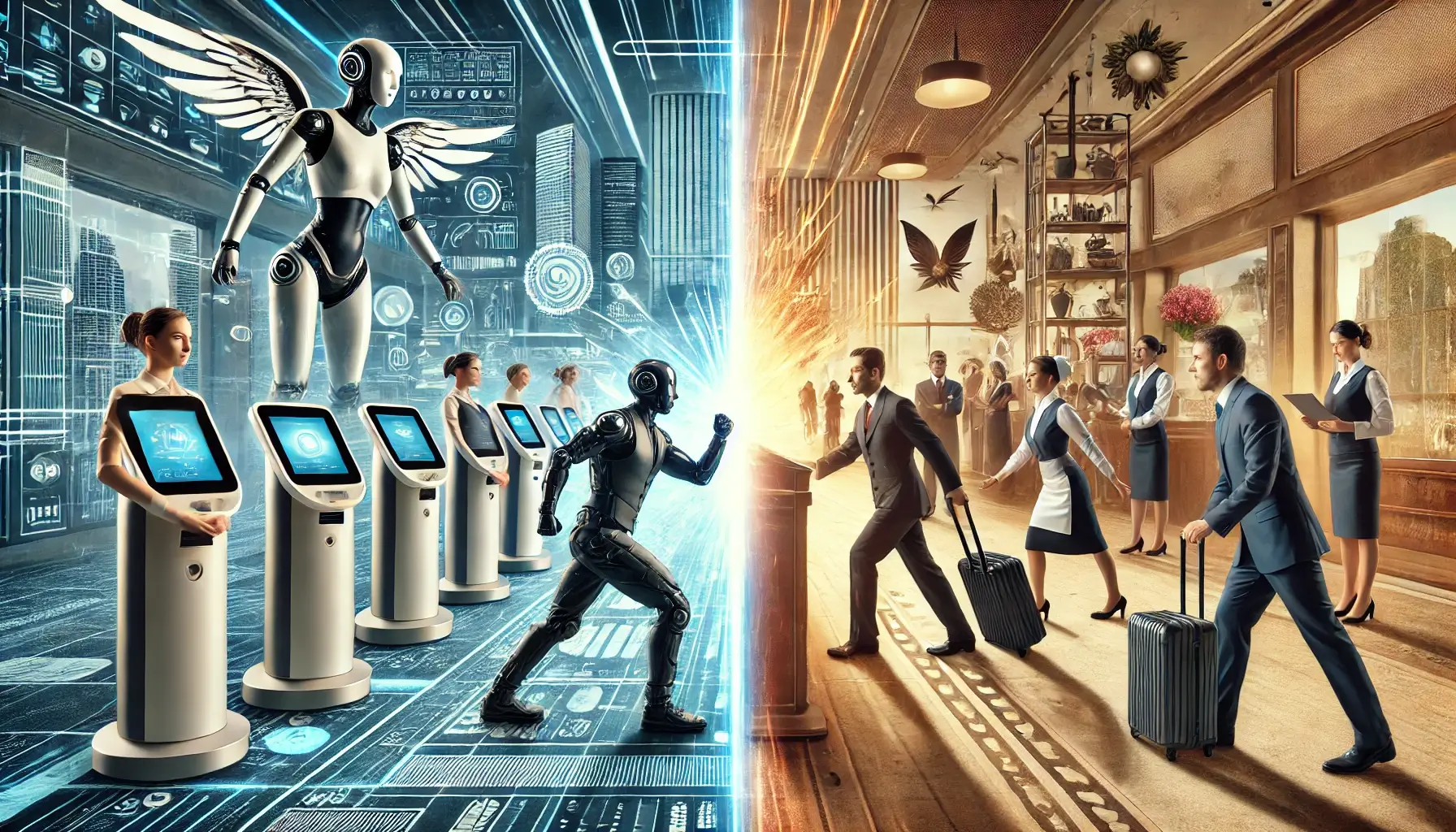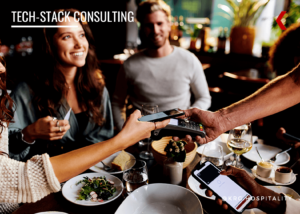Bridging the Gap Between Technology and Personal Development in Hospitality
by Doug Radkey

We shouldn’t have to say this, but the above is an AI-generated image.
It’s said that between 70 percent and 80 percent of hospitality businesses plan to increase their investment in technology and AI over the next five years.
As the industry evolves, the key to success lies in bridging the gap between technology and personal development.
Exploring how integrating technology, artificial intelligence, and personal development can transform your hospitality business is more important now than ever before. It’s crucial that today’s operators understand and leverage these elements to improve operations, enhance guest experiences, and foster staff growth.
The Role of Technology in Modern Hospitality
In today’s fast-paced world, the hospitality industry is undergoing a significant transformation, driven by the rapid advancement of technology.
Hotels, restaurants, and bars are increasingly leveraging innovative tools such as AI, IoT (Internet of things), and data analytics to improve efficiency, personalize services, and to stay competitive. As these technological advancements continue to evolve, they are reshaping the landscape of this hospitality, making it more dynamic and responsive to the ever-changing needs of guests.
While technology offers numerous benefits to the hospitality industry, it also presents several challenges and potential downsides. One significant concern is the risk of de-personalization, as the increased use of automated systems and AI can create a barrier between guests and staff. This barrier has the potential to diminish the personalized touch that is a hallmark of exceptional hospitality.
Additionally, the learning curve for staff can be steep. Team members may require extensive training and ongoing support to utilize new technologies effectively. This can lead to initial inefficiencies and frustration as employees adapt to unfamiliar tools and processes.
Balancing technological advancements with human interaction is crucial to maintaining the warmth and personalized service that guests expect, while also ensuring that staff are adequately equipped, and comfortable with the technological tools at their disposal.
The Emergence of AI in Hospitality
There is no better example of the transformative impact of technology on modern hospitality than the recent developments in artificial intelligence. Hospitality-centric AI applications range from chatbots and predictive analytics such as dynamic pricing tools to personalized marketing platforms, offering a plethora of benefits.
Leading hotel chains like Marriott and Hilton have successfully implemented AI-driven guest services and operational efficiencies, setting new standards in the industry.
For example, these hotels are increasingly using AI to personalize the guest experience, from check-in to check-out. Hilton’s Connie, powered by IBM Watson‘s AI, acts as a concierge, assisting guests with information about hotel amenities, dining recommendations, and local attractions.
AI enhances guest personalization by tailoring services to individual preferences while streamlining operations through automation, and providing valuable insights into guest behavior and preferences.
However, these advancements are not without challenges. Data privacy concerns are paramount, requiring stringent measures to protect guest information. Additionally, ongoing management and updates necessitate in-depth training and processes for staff to effectively integrate AI into their daily routines.
Balancing these challenges with the benefits is crucial to harnessing this technology to its full potential in hospitality.
The Importance of Personal Development in Hospitality
The rapid advancement of technology in the hospitality industry underscores the critical importance of continuous staff training and development. As new tools and systems are introduced, keeping staff updated with the latest technological advancements is essential.
Continuous training programs ensure that employees are proficient in using these new technologies, which not only enhances their productivity but also improves the overall guest experience.
For instance, regular workshops and online courses can help staff stay abreast of the latest AI applications and digital tools, enabling them to seamlessly integrate these advancements into their daily operations.
In addition to keeping up with technology, skill enhancement plays a crucial role in personal development. Key skills for hospitality staff must now include digital literacy, adaptability, and emotional intelligence on top of the core values team members should come to understand during onboarding.
Three Keys
Digital literacy ensures that employees can navigate and utilize various digital platforms and tools effectively. Adaptability is essential in a fast-paced industry where change is constant, enabling your staff to adjust quickly to new processes and technologies. Emotional intelligence, which involves understanding and managing one’s emotions and those of others, is particularly important in hospitality, where guest services and interaction are paramount.
Developing these skills through targeted training programs—along with onboarding those that fit your values—can enhance staff performance and guest satisfaction significantly. Moreover, personal development initiatives can greatly influence staff motivation and retention by investing in the continuous growth and development of your employees.
When staff feel valued and see opportunities for personal and professional growth, they are more likely to stay with your business, reducing turnover rates. This is particularly important in this industry, where high turnover can disrupt operations and negatively impact service quality.
By fostering a culture of continuous learning and development despite the advancements in technology, your business can create a motivated and loyal workforce that is committed to delivering exceptional guest experiences.
Bridging the Gap: Integrating Technology and Personal Development
To truly revolutionize this industry, it is essential to adopt a holistic approach that integrates technology while maintaining a strong focus on human elements. A balanced approach ensures that while technology streamlines operations and enhances guest experiences, the human touch remains a key component of hospitality.
This integration involves not only the implementation of advanced technologies but also the development of staff skills to use these tools effectively.
Such an approach ensures your business can harness the full potential of both technology and its workforce, creating a seamless and enriching experience for both staff and guests.
Creating effective training programs is a critical step in this integration. These programs should include comprehensive education on technology and AI, ensuring that staff are not only familiar with new tools but also confident in using them.
Keys to Effective Training
Training should be continuous and not a one-off or a one-hour briefing, and should cover practical aspects of technology use.
For example, this may include operating digital check-in systems or utilizing AI-driven guest service platforms, as well as theoretical understanding of how these technologies enhance operations and guest satisfaction.
Regular workshops, online courses, and hands-on training sessions can help staff stay updated with technological advancements, and develop the necessary skills to leverage these tools in their daily tasks.
Fostering a collaborative culture is equally important in helping staff embrace these new technologies. Encouraging a culture of collaboration and continuous improvement can significantly ease the transition to a technology-enhanced workplace. Involving staff in the decision-making process and encouraging feedback ensures that team member feel valued. Therefore, they are more likely to engage with new technologies.
Bridging the gap between technology and personal development requires a balanced approach that integrates technological advancements with comprehensive training programs and a collaborative culture. This holistic strategy ensures that the hospitality industry can leverage the benefits of technology while maintaining the essential human touch that defines the exceptional service we all love and strive for.
Integrating the Technology
Integrating technology and personal development doesn’t set aside the requirement for careful assessment and planning. Begin by evaluating your current technology and training needs to identify gaps, and opportunities for improvement.
Conduct an audit of your existing systems and processes (tech-based and non-tech-based systems), gather feedback from your staff, and set clear objectives for integration. A thorough assessment helps create a strategic playbook that aligns technological advancements with the developmental needs of your staff, ensuring a cohesive approach.
When it comes to technology adoption, it’s crucial to select and implement new tools that complement your personal development goal, operational needs, and guest experiences. Choose technologies and AI tools that enhance operational efficiency and guest experiences without compromising the human element.
Consider factors such as ease of use, scalability, and integration capabilities. Pilot testing new technologies before full implementation can help identify potential issues, and ensure a smoother transition.
Regular updates and feedback are essential for maintaining the effectiveness of your technology and training programs. Take the time to establish a continuous feedback loop where staff can share their experiences and suggestions for improvement, and then update your systems and training materials regularly to reflect the latest advancements and best practices.
This proactive approach ensures that your team remains equipped with the knowledge and skills needed to leverage new technologies more effectively.
Overcoming Resistance to Change
If you’ve been operating for a number of years and the embracing of technology is new to your style of operations, you may receive resistance from staff who have been with you for a while. Addressing potential resistance to change is a common challenge in integrating technology (or any other type of change).
Strategies for overcoming this resistance may include involving staff in the decision-making process, providing comprehensive training, and highlighting the benefits of new technologies. Developing a growth-based mindset within your workplace culture—through positive reinforcement and recognition of early adopters—can also help encourage acceptance and enthusiasm for change.
Lastly, continuous improvement is vital for sustaining the benefits of technology and personal development initiatives while positioning your brand for the new era that’s upon us.
Evaluate the impact of new technologies and training programs on your operations regularly, and be aware of guest satisfaction scores. Use performance metrics and feedback to identify areas for improvement, and make necessary adjustments.
This commitment to ongoing development ensures that your hospitality business remains competitive and adaptive to future industry changes.
Bridging the gap between technology and personal development is essential for creating a seamless and enriching experience for both staff and guests. Embrace these approaches so your business can innovate and thrive, while still maintaining the warmth and personalized service that define exceptional hospitality.
Image: DALL-E

